Organisational Behaviour Report: M&S Culture, Factors, and Analysis
VerifiedAdded on 2021/01/03
|6
|1020
|384
Report
AI Summary
This report provides an overview of organisational behaviour, focusing on the concept of organisational culture and its impact on individual and team performance within a company setting, using Marks & Spencer (M&S) as a case study. The report defines organisational culture, highlighting its values, beliefs, and assumptions. It then discusses factors influencing organisational culture, such as structure and leadership, emphasizing their importance. The report further explores the stages of organisational culture, referencing Edger Schein's model (artefacts, espoused values, and basic underlying assumptions). It critically analyzes how organisational culture influences individual and team behaviour and performance. The analysis utilizes Geert Hofstede's model to examine the influence of national or regional culture on company behaviour, considering dimensions such as means vs. goal orientation, internal vs. external drivers, easygoing vs. strict cultures, local vs. professional orientations, open vs. closed systems, and employee vs. work orientation. The report concludes by summarizing the key findings and insights regarding the role of organisational culture in shaping employee behaviour and overall organisational success.
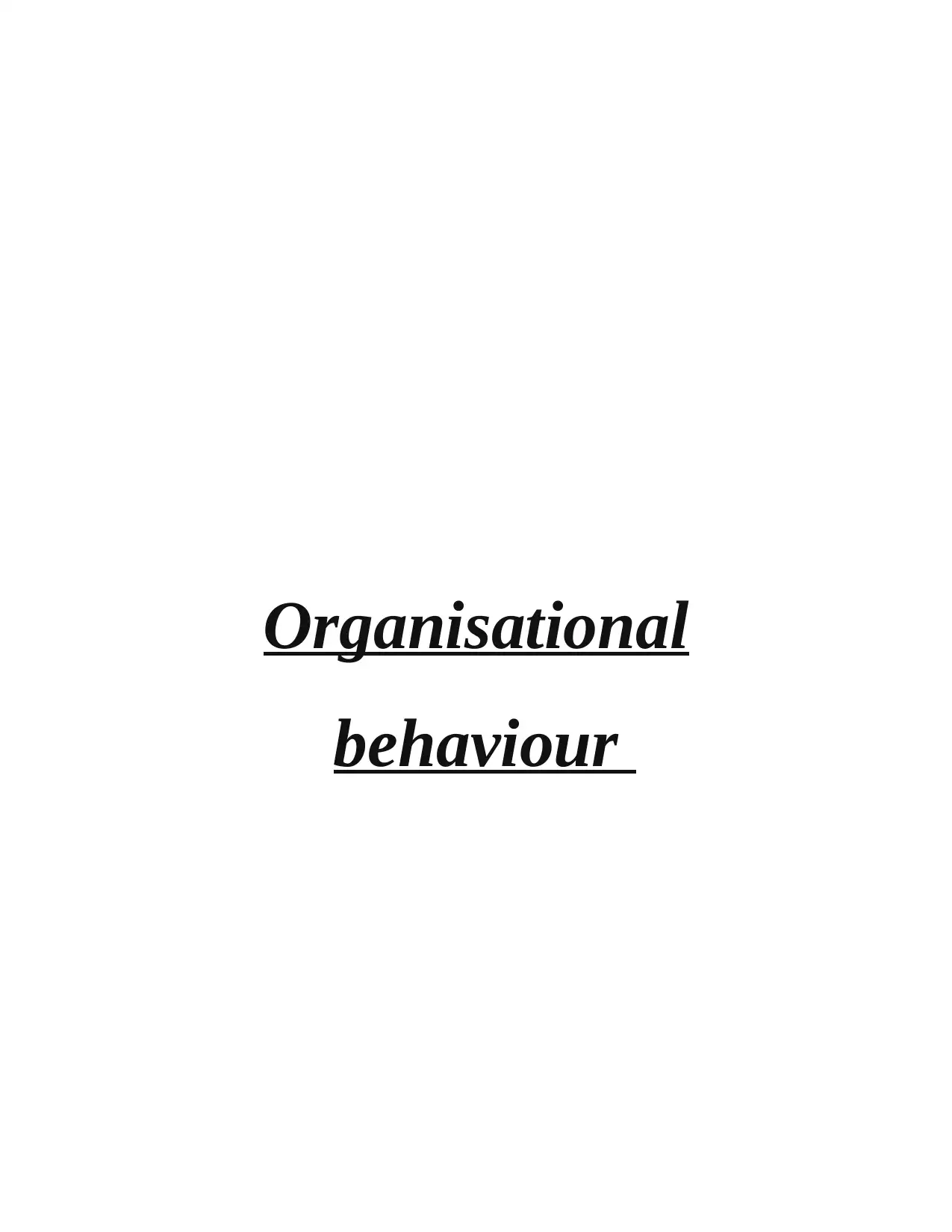
Organisational
behaviour
behaviour
Paraphrase This Document
Need a fresh take? Get an instant paraphrase of this document with our AI Paraphraser
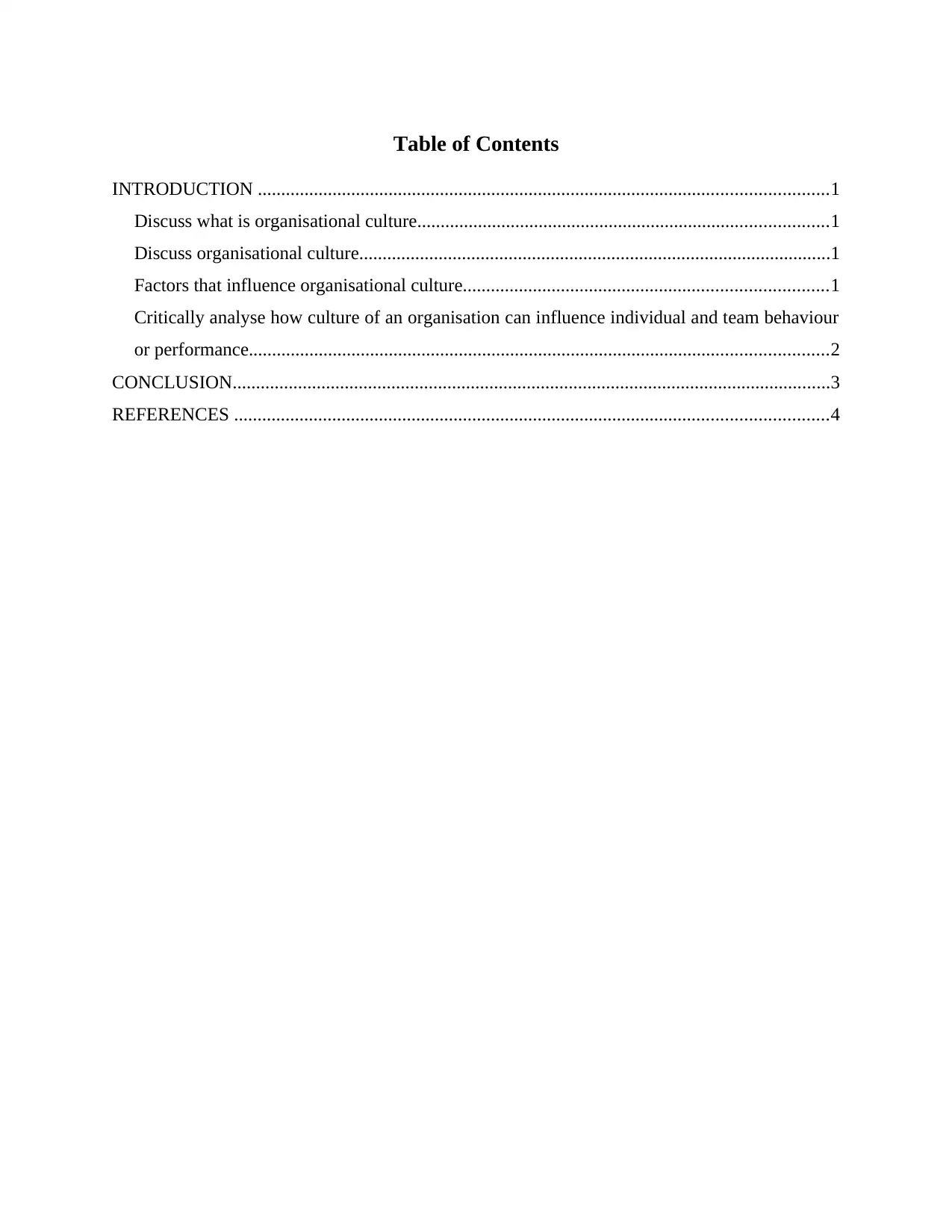
Table of Contents
INTRODUCTION ..........................................................................................................................1
Discuss what is organisational culture........................................................................................1
Discuss organisational culture.....................................................................................................1
Factors that influence organisational culture..............................................................................1
Critically analyse how culture of an organisation can influence individual and team behaviour
or performance............................................................................................................................2
CONCLUSION................................................................................................................................3
REFERENCES ...............................................................................................................................4
INTRODUCTION ..........................................................................................................................1
Discuss what is organisational culture........................................................................................1
Discuss organisational culture.....................................................................................................1
Factors that influence organisational culture..............................................................................1
Critically analyse how culture of an organisation can influence individual and team behaviour
or performance............................................................................................................................2
CONCLUSION................................................................................................................................3
REFERENCES ...............................................................................................................................4
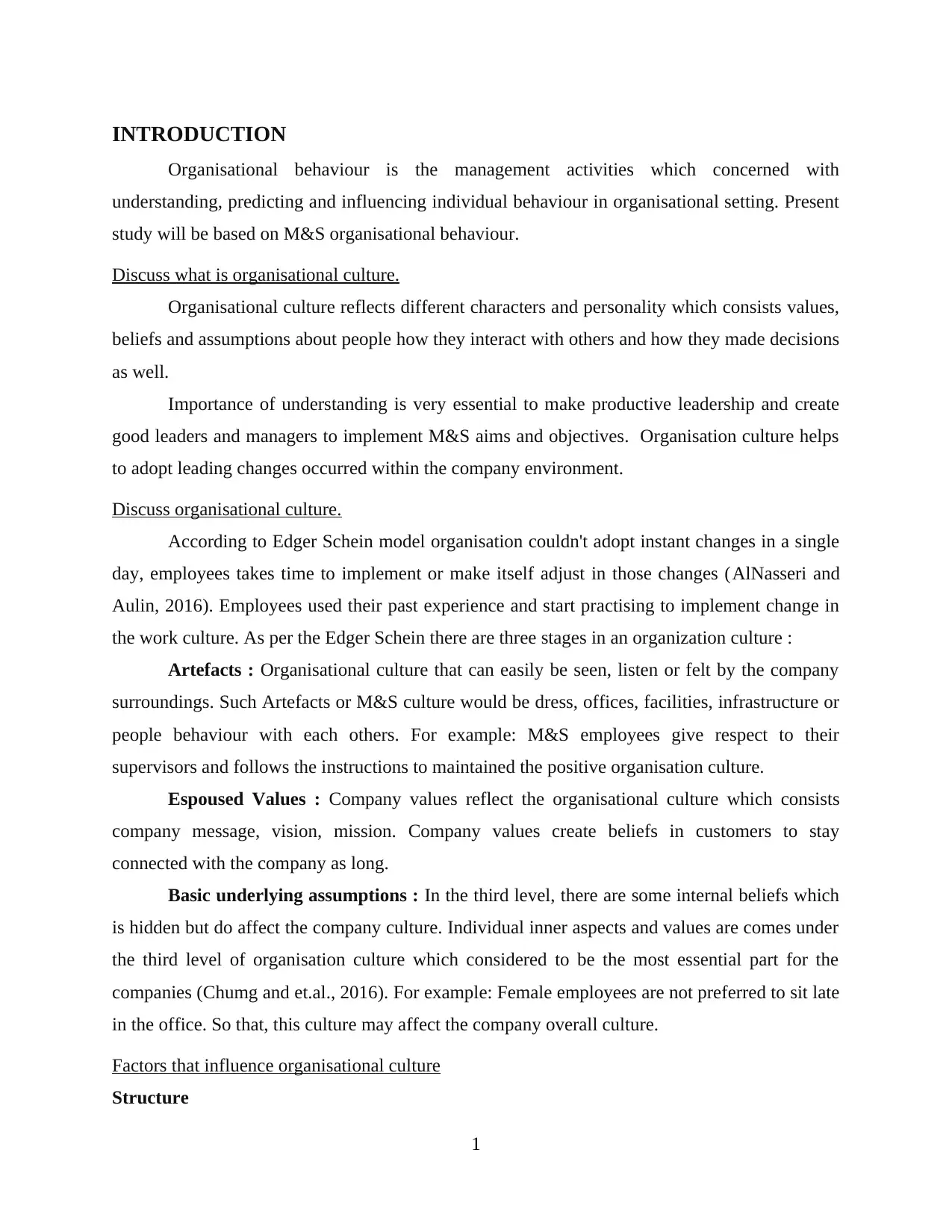
INTRODUCTION
Organisational behaviour is the management activities which concerned with
understanding, predicting and influencing individual behaviour in organisational setting. Present
study will be based on M&S organisational behaviour.
Discuss what is organisational culture.
Organisational culture reflects different characters and personality which consists values,
beliefs and assumptions about people how they interact with others and how they made decisions
as well.
Importance of understanding is very essential to make productive leadership and create
good leaders and managers to implement M&S aims and objectives. Organisation culture helps
to adopt leading changes occurred within the company environment.
Discuss organisational culture.
According to Edger Schein model organisation couldn't adopt instant changes in a single
day, employees takes time to implement or make itself adjust in those changes (AlNasseri and
Aulin, 2016). Employees used their past experience and start practising to implement change in
the work culture. As per the Edger Schein there are three stages in an organization culture :
Artefacts : Organisational culture that can easily be seen, listen or felt by the company
surroundings. Such Artefacts or M&S culture would be dress, offices, facilities, infrastructure or
people behaviour with each others. For example: M&S employees give respect to their
supervisors and follows the instructions to maintained the positive organisation culture.
Espoused Values : Company values reflect the organisational culture which consists
company message, vision, mission. Company values create beliefs in customers to stay
connected with the company as long.
Basic underlying assumptions : In the third level, there are some internal beliefs which
is hidden but do affect the company culture. Individual inner aspects and values are comes under
the third level of organisation culture which considered to be the most essential part for the
companies (Chumg and et.al., 2016). For example: Female employees are not preferred to sit late
in the office. So that, this culture may affect the company overall culture.
Factors that influence organisational culture
Structure
1
Organisational behaviour is the management activities which concerned with
understanding, predicting and influencing individual behaviour in organisational setting. Present
study will be based on M&S organisational behaviour.
Discuss what is organisational culture.
Organisational culture reflects different characters and personality which consists values,
beliefs and assumptions about people how they interact with others and how they made decisions
as well.
Importance of understanding is very essential to make productive leadership and create
good leaders and managers to implement M&S aims and objectives. Organisation culture helps
to adopt leading changes occurred within the company environment.
Discuss organisational culture.
According to Edger Schein model organisation couldn't adopt instant changes in a single
day, employees takes time to implement or make itself adjust in those changes (AlNasseri and
Aulin, 2016). Employees used their past experience and start practising to implement change in
the work culture. As per the Edger Schein there are three stages in an organization culture :
Artefacts : Organisational culture that can easily be seen, listen or felt by the company
surroundings. Such Artefacts or M&S culture would be dress, offices, facilities, infrastructure or
people behaviour with each others. For example: M&S employees give respect to their
supervisors and follows the instructions to maintained the positive organisation culture.
Espoused Values : Company values reflect the organisational culture which consists
company message, vision, mission. Company values create beliefs in customers to stay
connected with the company as long.
Basic underlying assumptions : In the third level, there are some internal beliefs which
is hidden but do affect the company culture. Individual inner aspects and values are comes under
the third level of organisation culture which considered to be the most essential part for the
companies (Chumg and et.al., 2016). For example: Female employees are not preferred to sit late
in the office. So that, this culture may affect the company overall culture.
Factors that influence organisational culture
Structure
1
⊘ This is a preview!⊘
Do you want full access?
Subscribe today to unlock all pages.

Trusted by 1+ million students worldwide
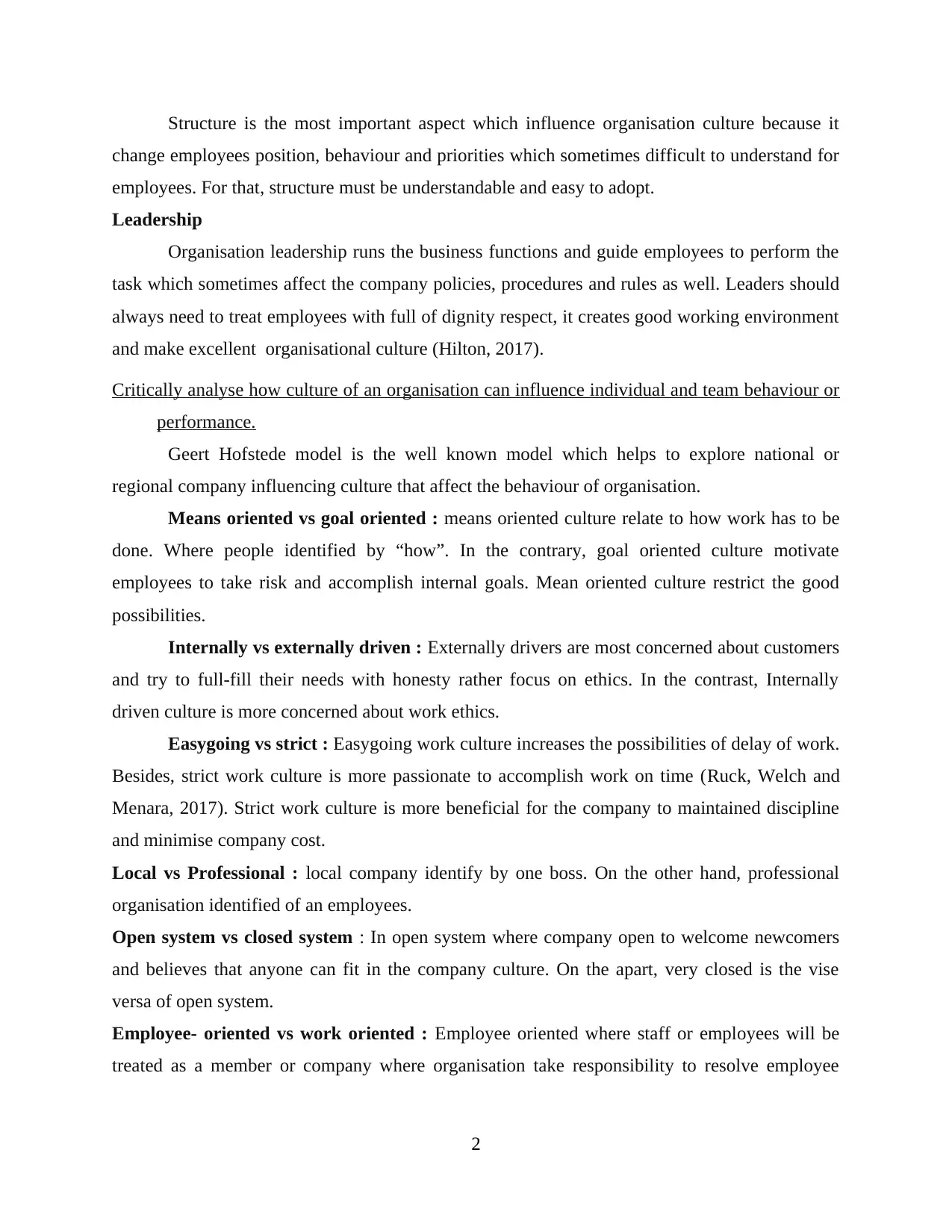
Structure is the most important aspect which influence organisation culture because it
change employees position, behaviour and priorities which sometimes difficult to understand for
employees. For that, structure must be understandable and easy to adopt.
Leadership
Organisation leadership runs the business functions and guide employees to perform the
task which sometimes affect the company policies, procedures and rules as well. Leaders should
always need to treat employees with full of dignity respect, it creates good working environment
and make excellent organisational culture (Hilton, 2017).
Critically analyse how culture of an organisation can influence individual and team behaviour or
performance.
Geert Hofstede model is the well known model which helps to explore national or
regional company influencing culture that affect the behaviour of organisation.
Means oriented vs goal oriented : means oriented culture relate to how work has to be
done. Where people identified by “how”. In the contrary, goal oriented culture motivate
employees to take risk and accomplish internal goals. Mean oriented culture restrict the good
possibilities.
Internally vs externally driven : Externally drivers are most concerned about customers
and try to full-fill their needs with honesty rather focus on ethics. In the contrast, Internally
driven culture is more concerned about work ethics.
Easygoing vs strict : Easygoing work culture increases the possibilities of delay of work.
Besides, strict work culture is more passionate to accomplish work on time (Ruck, Welch and
Menara, 2017). Strict work culture is more beneficial for the company to maintained discipline
and minimise company cost.
Local vs Professional : local company identify by one boss. On the other hand, professional
organisation identified of an employees.
Open system vs closed system : In open system where company open to welcome newcomers
and believes that anyone can fit in the company culture. On the apart, very closed is the vise
versa of open system.
Employee- oriented vs work oriented : Employee oriented where staff or employees will be
treated as a member or company where organisation take responsibility to resolve employee
2
change employees position, behaviour and priorities which sometimes difficult to understand for
employees. For that, structure must be understandable and easy to adopt.
Leadership
Organisation leadership runs the business functions and guide employees to perform the
task which sometimes affect the company policies, procedures and rules as well. Leaders should
always need to treat employees with full of dignity respect, it creates good working environment
and make excellent organisational culture (Hilton, 2017).
Critically analyse how culture of an organisation can influence individual and team behaviour or
performance.
Geert Hofstede model is the well known model which helps to explore national or
regional company influencing culture that affect the behaviour of organisation.
Means oriented vs goal oriented : means oriented culture relate to how work has to be
done. Where people identified by “how”. In the contrary, goal oriented culture motivate
employees to take risk and accomplish internal goals. Mean oriented culture restrict the good
possibilities.
Internally vs externally driven : Externally drivers are most concerned about customers
and try to full-fill their needs with honesty rather focus on ethics. In the contrast, Internally
driven culture is more concerned about work ethics.
Easygoing vs strict : Easygoing work culture increases the possibilities of delay of work.
Besides, strict work culture is more passionate to accomplish work on time (Ruck, Welch and
Menara, 2017). Strict work culture is more beneficial for the company to maintained discipline
and minimise company cost.
Local vs Professional : local company identify by one boss. On the other hand, professional
organisation identified of an employees.
Open system vs closed system : In open system where company open to welcome newcomers
and believes that anyone can fit in the company culture. On the apart, very closed is the vise
versa of open system.
Employee- oriented vs work oriented : Employee oriented where staff or employees will be
treated as a member or company where organisation take responsibility to resolve employee
2
Paraphrase This Document
Need a fresh take? Get an instant paraphrase of this document with our AI Paraphraser
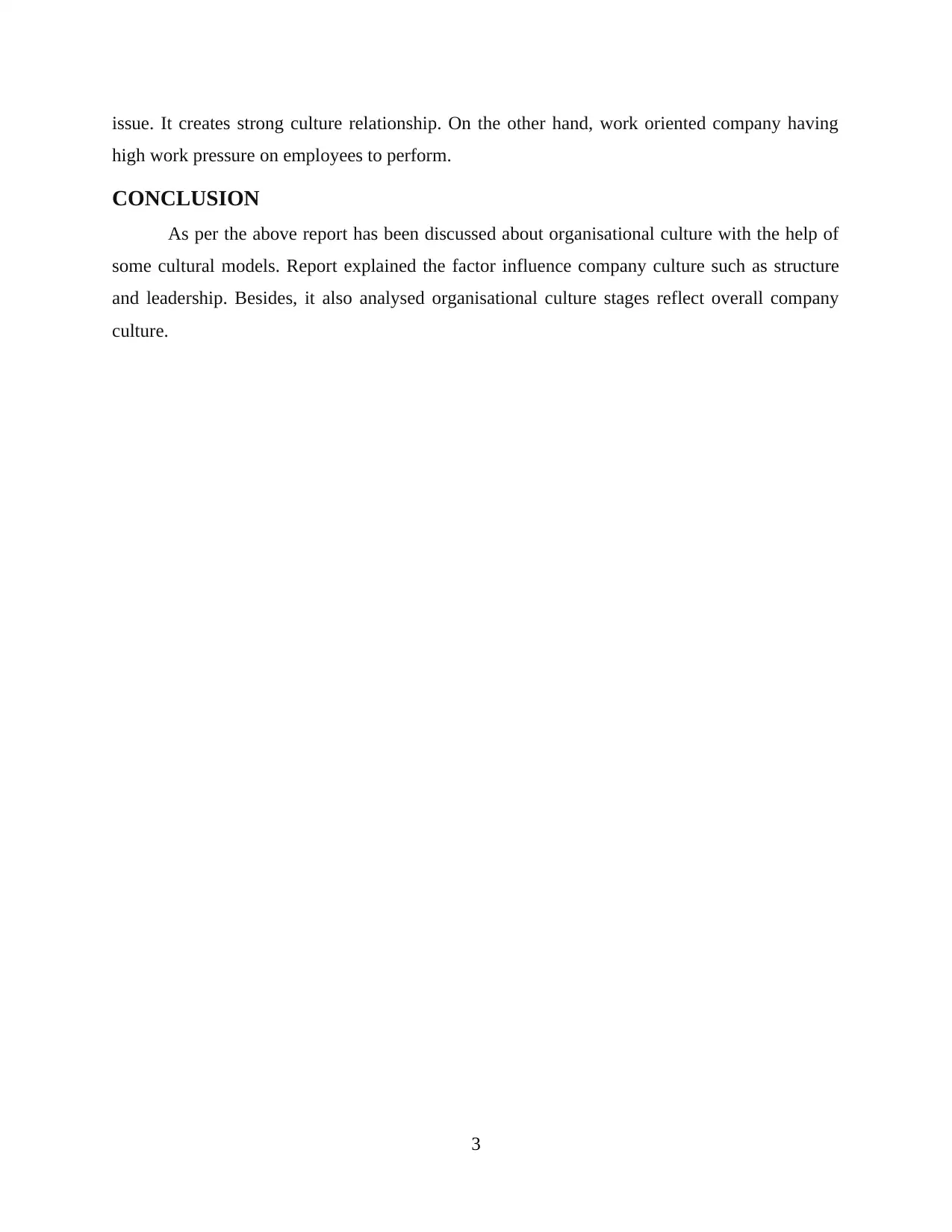
issue. It creates strong culture relationship. On the other hand, work oriented company having
high work pressure on employees to perform.
CONCLUSION
As per the above report has been discussed about organisational culture with the help of
some cultural models. Report explained the factor influence company culture such as structure
and leadership. Besides, it also analysed organisational culture stages reflect overall company
culture.
3
high work pressure on employees to perform.
CONCLUSION
As per the above report has been discussed about organisational culture with the help of
some cultural models. Report explained the factor influence company culture such as structure
and leadership. Besides, it also analysed organisational culture stages reflect overall company
culture.
3
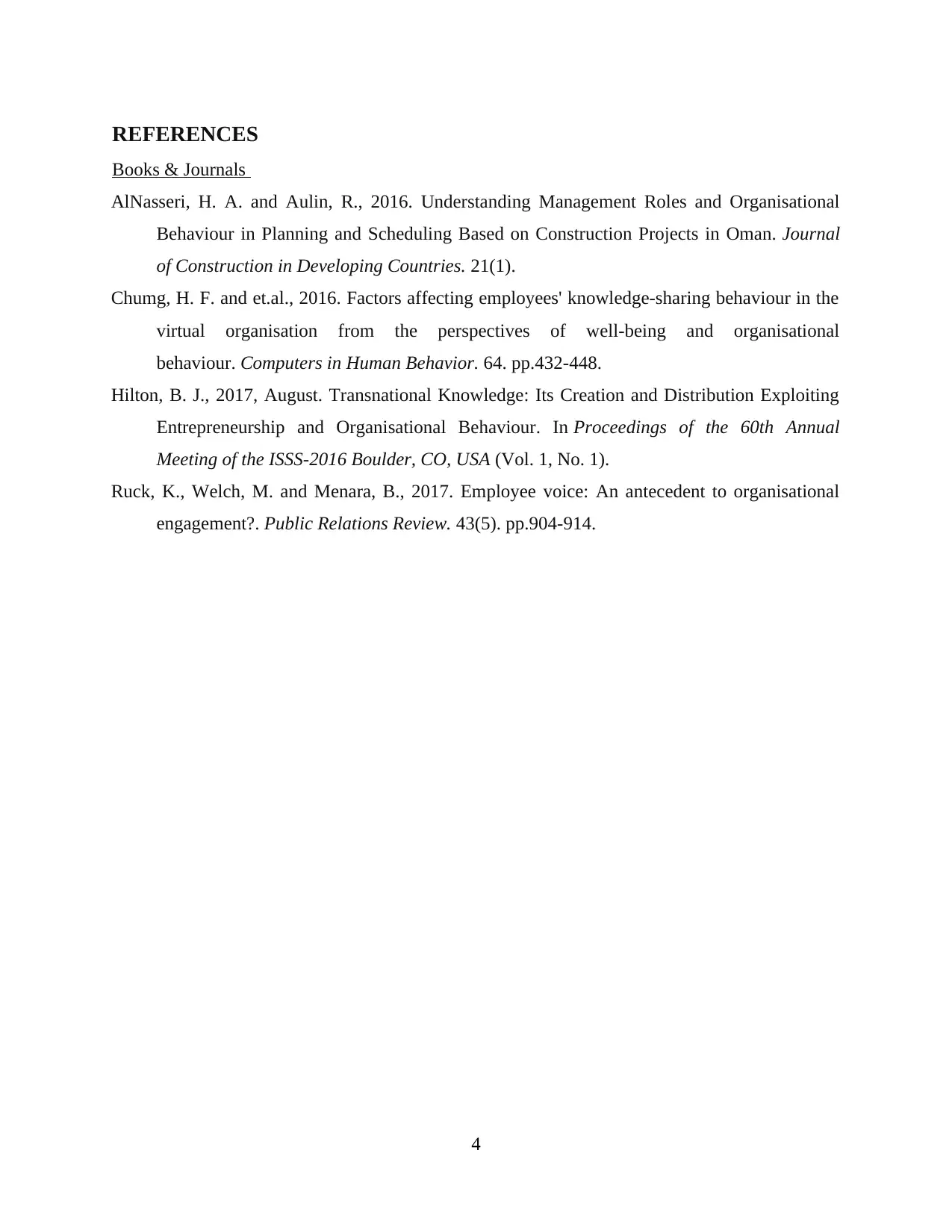
REFERENCES
Books & Journals
AlNasseri, H. A. and Aulin, R., 2016. Understanding Management Roles and Organisational
Behaviour in Planning and Scheduling Based on Construction Projects in Oman. Journal
of Construction in Developing Countries. 21(1).
Chumg, H. F. and et.al., 2016. Factors affecting employees' knowledge-sharing behaviour in the
virtual organisation from the perspectives of well-being and organisational
behaviour. Computers in Human Behavior. 64. pp.432-448.
Hilton, B. J., 2017, August. Transnational Knowledge: Its Creation and Distribution Exploiting
Entrepreneurship and Organisational Behaviour. In Proceedings of the 60th Annual
Meeting of the ISSS-2016 Boulder, CO, USA (Vol. 1, No. 1).
Ruck, K., Welch, M. and Menara, B., 2017. Employee voice: An antecedent to organisational
engagement?. Public Relations Review. 43(5). pp.904-914.
4
Books & Journals
AlNasseri, H. A. and Aulin, R., 2016. Understanding Management Roles and Organisational
Behaviour in Planning and Scheduling Based on Construction Projects in Oman. Journal
of Construction in Developing Countries. 21(1).
Chumg, H. F. and et.al., 2016. Factors affecting employees' knowledge-sharing behaviour in the
virtual organisation from the perspectives of well-being and organisational
behaviour. Computers in Human Behavior. 64. pp.432-448.
Hilton, B. J., 2017, August. Transnational Knowledge: Its Creation and Distribution Exploiting
Entrepreneurship and Organisational Behaviour. In Proceedings of the 60th Annual
Meeting of the ISSS-2016 Boulder, CO, USA (Vol. 1, No. 1).
Ruck, K., Welch, M. and Menara, B., 2017. Employee voice: An antecedent to organisational
engagement?. Public Relations Review. 43(5). pp.904-914.
4
⊘ This is a preview!⊘
Do you want full access?
Subscribe today to unlock all pages.

Trusted by 1+ million students worldwide
1 out of 6
Related Documents
Your All-in-One AI-Powered Toolkit for Academic Success.
+13062052269
info@desklib.com
Available 24*7 on WhatsApp / Email
![[object Object]](/_next/static/media/star-bottom.7253800d.svg)
Unlock your academic potential
Copyright © 2020–2025 A2Z Services. All Rights Reserved. Developed and managed by ZUCOL.





